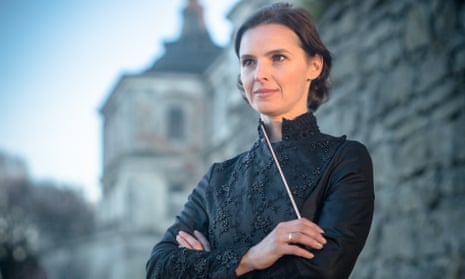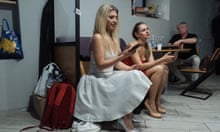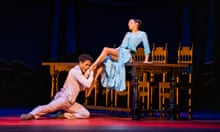For the first time in its 145-year history, the Bayreuth opera festival has been opened by a female conductor.
Oksana Lyniv was applauded with warmth and vigour by the festival audience at the end of conducting Richard Wagner’s Flying Dutchman.
The festival had been forced to take a break last year due to the pandemic, delaying Lyniv’s long-awaited debut and increasing excitement around the event.
In the audience was the German chancellor, Angela Merkel, a Wagner aficionado, and her husband, Joachim Sauer, labelled “Phantom of the Opera” for his low-key appearances at Bayreuth by his wife’s side throughout her time in office.
Merkel’s reaction to a woman at the podium for the first time was a simple: “Finally!”

Lyniv, 43, from Ukraine, was previously principal conductor of Austria’s Graz Opera as well as a former assistant to the incumbent Berlin Philharmonic chief conductor, Kirill Petrenko, when he was at the Bavarian State Opera.
Katharina Wagner, the great-granddaughter of Richard Wagner and the festival’s outgoing director, said there had been few female conductors in the past to choose from, but that Lyniv represented a new generation “courageous enough” to learn to conduct.
Lyniv told the Berliner Zeitung newspaper what mattered to the orchestra was not her sex but her ability.
“The orchestra sees after three minutes whether you’re able to conduct or not … it notices immediately whether you can answer concrete musical questions, how your baton technique is and whether you’re capable of leading a hundred people without concern. If they can trust you on this basis, then the musicians are not in the least bit interested whether a man or a woman is conducting. Only the journalists do that.”
Asked why she thought conducting had remained a male domain for so long, Lyniv said: “It’s to do with the development of society. Up until well into the 80s there were still a few prominent orchestras that didn’t accept women as musicians. Women were also societally disadvantaged – just think about labour rights. But in the past five years, a lot has happened. The most important opera houses are making an effort to put on up to three productions led by women.”
The Bayreuth festival, which runs until 25 August, is taking place amid tight restrictions for cultural events in an effort to keep German coronavirus infection rates under control. This year, only about 900 audience members are allowed to attend each performance – half of the usual capacity. Seats are restricted to those who have been vaccinated, have recovered from the virus or have had a negative test.









